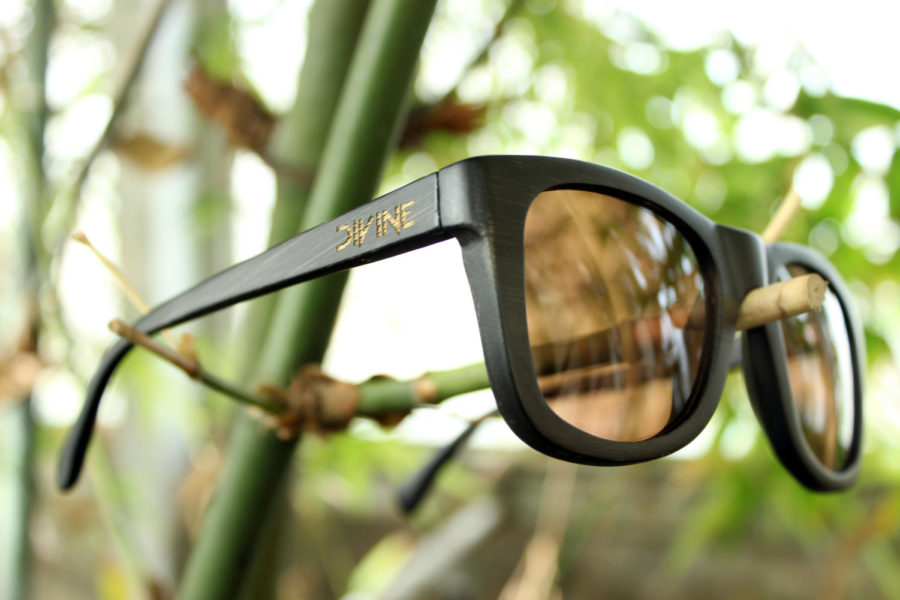Seeing things differently: ISU students focus on making eco-friendly products out of bamboo
Liz Ulrichson/Iowa State Daily
Divine sunglasses made out of bamboo were created by Wicitra Mahotama, a senior in Environmental Science and Ryan Zumbach, a sophomore in Industrial Design.
October 9, 2014
Wicitra Mahotama was hiking up the side of a volcano in Indonesia when the idea came to him.
Bamboo.
The idea was to use bamboo to be more eco-friendly.
He said he was hiking up the side of a volcano and noticed that the soil was left bare and washed away due to lack of canopy coverage. This inspired his idea to plant bamboo that has leaves to cover the soil.
Then Mahotama had another idea on how to use bamboo. He talked with his mom’s friend, who makes jewelry out of wood, and helped him to create their product.
Now, Mahotama, senior in environmental science, and Ryan Zumbach, sophomore in industrial design, are developing a business centered on being eco-friendly.
The two created Divine Eyewear and one of their products is sunglasses made entirely out of bamboo.
“The philosophy we have taken is dream big, start small, move fast,” said Mahotama about Divine Eyewear.
Their product is currently being created out of bamboo from China, but within the next three to five months, they hope to be using only bamboo from Indonesia.
Right now the quality of bamboo in Indonesia is not where they would like it to be. They want to eventually get all their bamboo from Indonesia because of the effect it will have helping local farmers.
They also said they want to move away from getting bamboo from China because of the levels of pollution in the country.
The business partners chose bamboo for several different reasons. Bamboo reduces soil erosion and protects local streams from sediment loads. It will also help farmers capture additional value from marketing a low-input crop said Drew Sherman, senior in economics and friend of Zumbach.
“It will give us a step ahead of our competitors because it is environmentally and socially conscience,” Mahotama said.
Using a sustainable resource was very important for the partners because of the positive effect it has on the environment.
“I’m a strong proponent of the use of sustainable resources, especially in everyday products,” Sherman said.
Mahotama and Zumbach became business partners after Zumbach moved into the Acacia Fraternity with Mahotama. Mahotama approached Zumbach with the idea and said he needed a “design thinker” to help him out.
Zumbach, an industrial design student, was the perfect match and has helped create the business logos and website. In the future, Zumbach said he hopes to create all his own frame styles.
Their sunglasses currently take a month from the day of order to reach the customer. They are still in the process of designing sunglasses and they hope to have their designs complete by the spring.
“Our goal is to have at least three different styles,” Zumbach said.
The duo has been selling the sunglasses since Labor Day and have sold 30 pairs at $50 each. They sold out their first shipment in a week. Their goal is to sell at the middle market because they said they want to sell a high quality product that is also affordable.
“Right now there isn’t much of a middle market. Sunglasses are either $5 or over $100,” Mahotama said.
They are currently selling to students by word of mouth and a few customers on their website.
“Economically, small businesses aren’t as highly efficient as large corporations, but they’re great because they put money and opportunity in the hands of smallholder farmers,retailers and entrepreneurs,” Sherman said.
In the future, the pair hopes to expand Divine Eyewear beyond sunglasses and create other products, such as toothbrushes and phone cases.
Divine Eyewear focuses on being socially aware by donating half their profits to a similar business with the same model of environmental and social responsibility. The business they chose is an international resource exchange branch in Indonesia.
“Our generation is very forward-thinking and eco-conscience,” said Mahotama on why he wants to expand.
He said he believes the millennial generation is going to be the one that makes a major change and impact on the world.

















